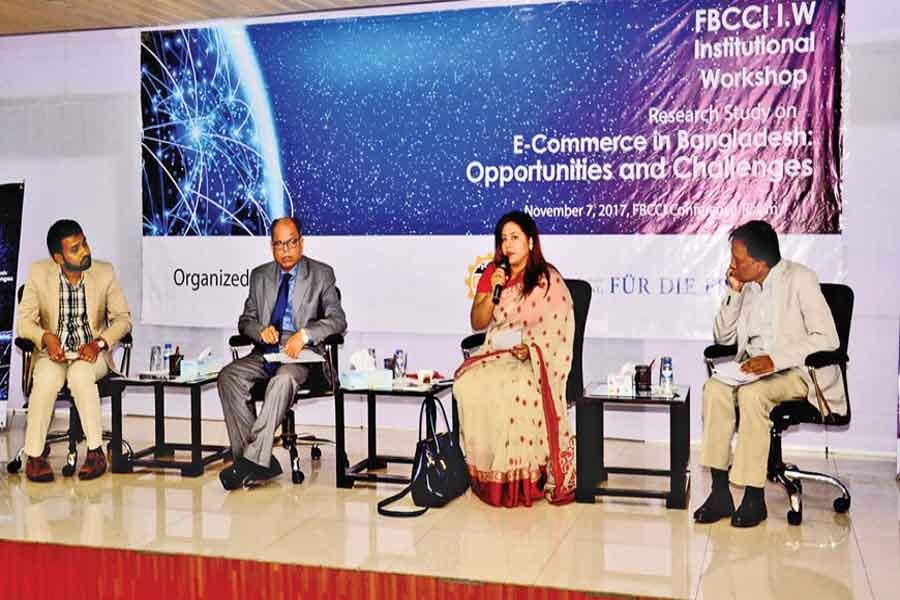Speakers at a programme on Tuesday called for framing necessary legal framework for the sake of sustainable growth of e-commerce in the country.
Keeping this in view, they suggested immediate enactment of the proposed 'Digital Security Act 2016' and framing 'e-commerce policy' in the country to govern e-commerce activities.
The speakers also said there was an urgent need for widening online transaction system with improved product delivery, hi-speed Internet and enhanced cyber security to facilitate the growth of the sector.
The suggestions came at a workshop on 'E-commerce in Bangladesh: Opportunities and Challenges' jointly organised by the Federation of Bangladesh Chambers and Commerce and Industry (FBCCI) and Friedrich Naumann Foundation (FNF) at the FBCCI headquarters in the city.
Presided over by FBCCI director and e-Commerce Association of Bangladesh (e-CAB) adviser Shomi Kaiser, the programme was also addressed by FNF country representative in Bangladesh Dr Najmul Hossain, FBCCI acting secretary-general Hussain Jamil, and North South University Economic Department Lecturer Nuheen Khan.
Presenting the findings of a study titled 'E-commerce in Bangladesh: A Story of Adoption and Success', Mr Khan said supportive policy is required for the further development of e-commerce sector.
At the same time, the entrepreneurs' access to finance via venture capital companies, business accelerators, and angel investors should be popularised for continuous growth of the sector.
According to Business to Consumer (B2C) e-commerce index developed by the United Nations Conference on Trade and Development (UNCTAD), Bangladesh ranked 103 out of 144 countries in 2017, a sharp 14 step lift from 2016's position.
Citing e-CAB data, he said e-commerce contributed Tk 25 billion or around 1.0 per cent to the country's GDP in 2016, which indicates the fast growth of the sector recent years.
However, some 90 per cent of the transactions in e-commerce industry was done through mobile financial systems (MFSs) and cash-on-delivery while credit or debit card payments hold only 10 per cent share.
He said there were around 10 million debit card and one million credit card holders in the country but only a small number of them can use their cards due to restrictions and local online market places' inability to accept cards.
Bangladesh Telecommunication Regulatory Commission (BTRC) data shows that the country has a total of 73.2 million internet users, of which 68.6 million (94 per cent) access internet through mobile phones and the rest 4.6 million use broadband.
Referring to the Bangladesh Association of Software and Information Service (BASIS) data, he said around 22 per cent of the internet users purchases products from various online platforms regularly or irregularly.
Mentioning that the internet speed is quite slow outside Dhaka, Mr Khan said internet price, especially mobile data package is higher compared to that of neighbouring countries like India Pakistan and Sri Lanka.
He also said that the product delivery system needs more concentration for speedy delivery of the products purchased online and Bangladesh Post Office can play a significant role in that case because of the state organisation's country-wide network.
Speaking on the occasion, Shomi Kaiser said e-commerce sector could contribute significantly like readymade garments (RMG) or leather industry aided by policy.
However, a draft of e-commerce policy is now under scrutiny, which will be discussed in the parliament and will be finalised shortly.
She also said access to finance and identifying the potential market can help e-commerce-based entrepreneurs expand their respective businesses.
Ms Kaiser also mentioned that e-CAB is working closely with the postal department to examine the possibility of delivering products purchased online using the government postal service.


